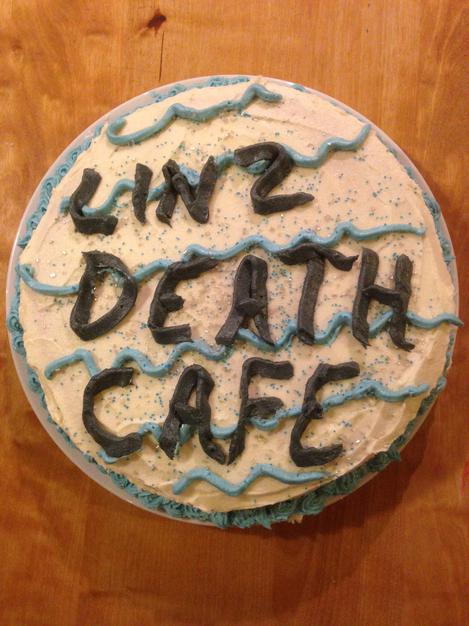What do people talk about at a Death Cafe?
 Posted by
Aileen
Posted by
Aileen

The Death Cafe in Linz, Austria, “Mit dem Tod bei Kaffee und Kuchen”, has been taking place every month since November 2015. Sometimes the group is small, only about seven or eight people, but sometimes there are more than twenty participants, although the average is about ten to fifteen. Ages of the participants range from 17 to 94, and personal experiences vary even more widely. We meanwhile have a small core of “regulars”, who come to nearly every Death Cafe, many “returning visitors”, but also new visitors every month. New visitors are regularly surprised by the diversity of the group, but invariably also deeply impressed by the warm and welcoming atmosphere and the quality of the conversations. For me, it is especially touching to watch how friendships have grown among the “regulars”, who usually only know each other through Death Cafe. One indication of how established the Death Cafe has become in Linz, I think, is that I am more and more frequently approached by different people – whether friends, passing acquaintances or complete strangers – who have heard of Death Cafe and want to know more about it. I have been approached in the supermarket, on the street, in my favorite bar, at concerts … and asked what people actually talk about at Death Cafes. To give an idea of what conversations can be like, I want to list a few of my favorite quotations from our Death Cafe in Linz: Talking about funerals and eulogies: “In the way we live, maybe we should also keep in mind the entertainment value of our future eulogy. We don’t want the mourners at our funeral to get bored.” About death at a young age (from our youngest “regular”): “How old do you have to be, before you are not too young to die?” From our oldest participant: “Let’s not get bogged down in our own sadness. Let’s talk about what is really important!” A young woman talking about the death of her father following a very conflicted relationship in life: “I keep talking to him, though. He has actually learned a lot since he died.” Talking about end of life care: “What kind of working conditions do medical and care staff need, so that they can provide the kind of care we want for ourselves and our loved ones?” A young man talking about the birth and death of his daughter: “She only lived for six minutes, but in those six minutes the sense of what life is was incredibly powerful.” Talking about cremation versus burial: “When I die, I want to be buried. Life is so hectic, I want to take my time decomposing when I’m dead.” A frequently recurring question is, of course, what should one say to someone newly bereaved, and what should one not say? We have heard so many different touching, useful, and even funny stories from visitors about their experiences with bereavement and reactions from others. Another topic that comes up often is about how to start a conversation with aging or ill parents, but from various accounts it seems that the easiest way to start that conversation is simply to casually mention having attended a Death Cafe and how surprisingly positive the experience was. It is always encouraging when people return to tell us enthusiastically about conversations they have had and arrangements they have been able to make – or to thank other Death Cafe participants for helping them find a way to let go and say good-bye to their loved ones when the time came. And who knew that imagining our own funerals could be so vastly entertaining?
Comments
Age of Death
“How old do you have to be, before you are not too young to die?” -> That's an odd question, since "young" vary from 20 to 50 years - at least here, in Brazil.
 Posted by The Silence
Posted by The Silence
Indeed, "young" is relative. Perhaps the context is missing for this question: other participants had been talking about what a tragedy it is, when someone dies at a young age, focusing on what they would potentially miss, rather than on how they had actually lived, even if it was for a relatively short time. The sentiment, "much too young to die" seems to be quite widespread, I think, at least here in Austria, and may be said of anyone not yet in their late 90s.
 Posted by Aileen
Posted by Aileen
